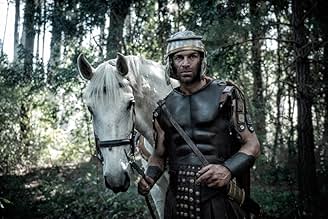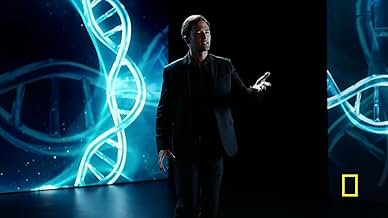Our primal curiosity has sparked new inventions and revealed the mysteries of the universe. This eight part mini series strives to trace the pivotal innovations that make us modern.Our primal curiosity has sparked new inventions and revealed the mysteries of the universe. This eight part mini series strives to trace the pivotal innovations that make us modern.Our primal curiosity has sparked new inventions and revealed the mysteries of the universe. This eight part mini series strives to trace the pivotal innovations that make us modern.
Browse episodes
Featured reviews
Someone once said trying to do a "Connections" type series without James Burke would be like watching the disconnected ramblings of a lunatic. Ladies and gentlefolk, I give you "Origins."
This is a National Geographic series about everything human and our world. It's a big subject. It's too big. The show is noise and fury without enough enlightenment. There are eight episodes. Each one tackles such a big part of human existence that it can't possibly cover them in one hour episodes. The show has a cast of educated presenters and host Jason Silva. Most of it is a series of reenactments, talking heads, and always the fast-cutting flashy connective sequences.
There are some issues with accuracy. It's problematic because one expects better from National Geographic. Did we really discover fire in 12,000 BC? Despite the importance of accuracy, the biggest problem is the show's scattered disjointed way of tackling each issue. It feels like the host Jason Silva is attacking me with his wild hand gestures and words. He's looking directly into the camera and barking at me. The flashy jolting presentation doesn't allow anything to sink in. The show jumps from one place and time to another and then another and another. It's too disjointed for anything educational to sink into the audience. By the end of each episode, I could only remember bits of disconnected information which leaves me with no new insight or new understanding. Apparently, all of transportation leads to the discovery of Marilyn Monroe. I don't know why that's important. It might be worthwhile for dumb people with no concept of science or history. For an educated audience, this really only skims the vast history of man. With such a big subject matter, this show could never dig that deep.
There are some issues with accuracy. It's problematic because one expects better from National Geographic. Did we really discover fire in 12,000 BC? Despite the importance of accuracy, the biggest problem is the show's scattered disjointed way of tackling each issue. It feels like the host Jason Silva is attacking me with his wild hand gestures and words. He's looking directly into the camera and barking at me. The flashy jolting presentation doesn't allow anything to sink in. The show jumps from one place and time to another and then another and another. It's too disjointed for anything educational to sink into the audience. By the end of each episode, I could only remember bits of disconnected information which leaves me with no new insight or new understanding. Apparently, all of transportation leads to the discovery of Marilyn Monroe. I don't know why that's important. It might be worthwhile for dumb people with no concept of science or history. For an educated audience, this really only skims the vast history of man. With such a big subject matter, this show could never dig that deep.
Look, I don't disagree with all the negative points that others have raised: flagrant inaccuracies; glaring omissions; irritating narration; poor acting; too America- / Euro-centric; and a dumbed-down patronising style. Nevertheless, I watched Origins primarily in order to learn interesting new facts, and it did teach me quite a few: Kublai Khan's pioneering use of paper money (although the show is inaccurate - the Song Dynasty were the first to issue paper money, before the Mongols); the work of Nostradamus as a plague healer (although the show inaccurately portrays him as a proper doctor, which he wasn't); Tollense (Germany) as the world's oldest large-scale battlefield; Robert Koch's role as the founder.of microbiology; and El Castillo (Spain) as the home of the world's oldest known cave painting. Therefore, in my opinion, it's not a bad show.
Was so psyched to see this. Such an interesting subject matter but the way this is presented with reality TV style commentary and cringe worthy dramatizaions, ruins what could have been a very interesting and educational series. Why oh why did you have to make it in this format? Such a waste. This is definitely for the "American Idol" audience. Going to have to look elsewhere to find some mentally provocative programming. Seems this is the way Nat Geo is going now.
For all you detractors of this series, I think your missing the point. There are probably thousands of us who had no idea of what our actual history is. So you don't like the presenter and there were probably some inventions that weren't included, but there was plenty of information for those of us who didn't know. I'm a senior with just a high school education and this series, including Jason Silva, kept me watching and even his repeated things made me listen more closely. It seems to me that even a simple person would learn from this series. Very educational.
Did you know
- TriviaJenny Umbhau's debut.
- ConnectionsFeatured in Timelapse of the Entire Universe (2018)
- How many seasons does Origins: The Journey of Humankind have?Powered by Alexa
Details
- Runtime
- 1h(60 min)
- Color
- Sound mix
Contribute to this page
Suggest an edit or add missing content

































